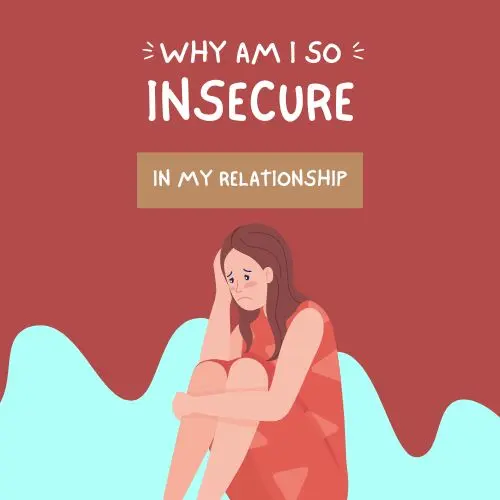Introduction
Feelings of insecurity can strain even strong relationships if left unaddressed. This comprehensive guide explores common causes, manifestations, and impacts of relationship insecurity. Crucially, it offers evidence-based strategies to develop greater self-worth and trust. With understanding and effort, insecure tendencies restricting fulfilment can shift to a nurturing foundation empowering you and your bond.
Understanding and Overcoming Relationship Insecurity
Data: Relationship Insecurity Factors (Journal of Social and Personal Relationships)
| Factors | Likelihood of Relationship Insecurity |
|---|---|
| Past Relationship Traumas | Very Likely |
| Low Self-Esteem | Likely |
| Attachment Anxiety | Likely |
| Jealousy Proneness | Somewhat Likely |
| Relationship Ambiguity | Somewhat Likely |
Understanding Relationship Insecurity
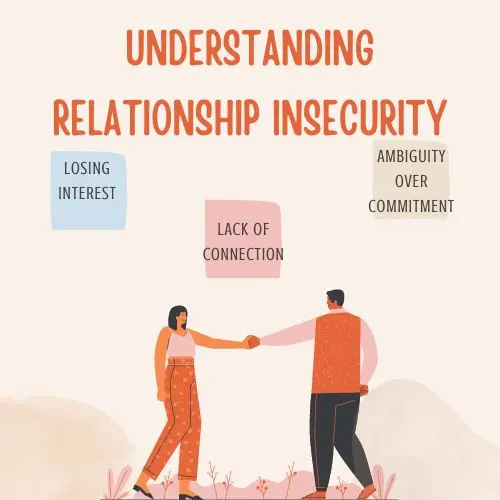
Insecurity arises from perceived threats – whether based on reality or not – to feel loved, accepted, and secure in a relationship. Commonly perceived threats include:
- Partner losing interest/falling for someone else.
- Not meeting a partner’s needs/expectations
- Lack of connection due to differences/distance
- Ambiguity over commitment/longevity of relationship
While typical at times, chronic insecurity strains bonds through resulting neediness, clinging behaviour, jealousy, and controlling tendencies if unchecked. This often backfires by distancing partners.
Roots of Relationship Insecurity
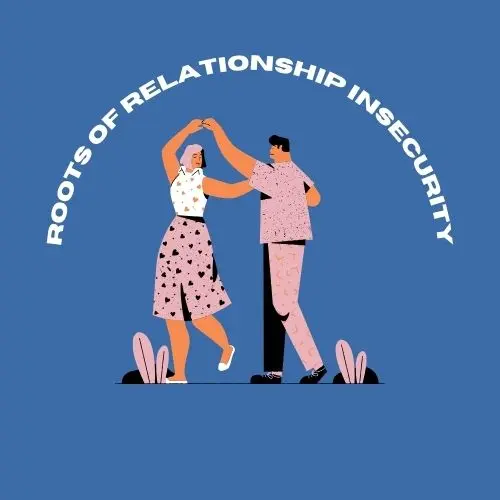
Insecurity often stems from past experiences/childhood that shape core beliefs, such as:
- Attachment wounds from early caregivers
- Traumatic relationship losses or betrayals
- Constant childhood messages of being unlovable
- Learning helplessness from overprotective parenting
- Genetic predispositions like rejection sensitivity
- Lack of self-esteem/confidence independent of others’ views
- Learning relationships requires sacrificing authentic needs
Awareness of personal triggers and core beliefs empowering healing and fulfilment within bonds.
Impact of Relationship Insecurity
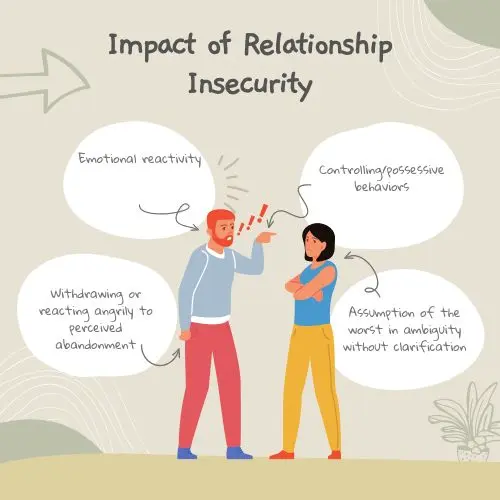
Toxic insecurity manifestations threaten intimacy if left unaddressed:
- Emotional reactivity and irrational jealousy
- Controlling/possessive behaviours
- Withdrawing or reacting angrily to perceived abandonment
- Assumption of the worst in ambiguity without clarification
- Needing constant reassurance at the expense of space
- Unwillingness to resolve issues for fear of further conflict
- Excessive focus on imaginary threats rather than the present
- Self-sabotaging behaviours to instigate/confirm fears
This damages trust in the long term through a self-fulfilling cycle.
Overcoming Relationship Insecurity
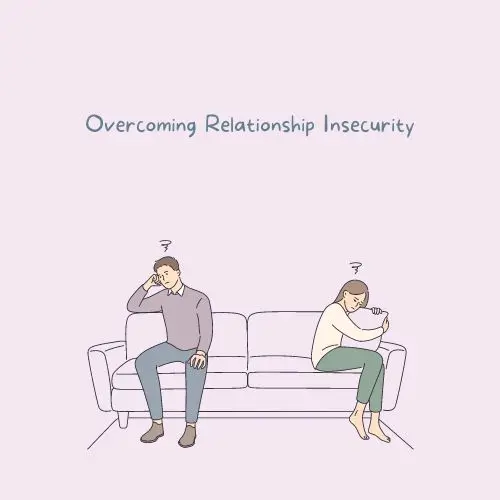
With compassion and effort, insecurity’s grip loosens:
- Self-Reflection – Note automatic thoughts and core beliefs driving reactions.
- Self-Esteem – Pursue interests/goals, boosting confidence independent of others’ views.
- Secure Attachment – Learn healthy emotional regulation and reassurance skills.
- Calm Communication – Express needs tactfully using “I feel” statements without attack.
- Trust Building – Follow through consistently on commitments with time.
- Self-Validation – Internally affirm your lovability is not contingent on anyone else.
- Mindfulness – Notice and soothe anxious thoughts without believing/reacting to them.
- Counselling – Develop a perspective and unpack roots with a skilled professional.
- Patience – Change requires ongoing conscious effort yet faith in the capacity for growth.
With self-compassion, persistent effort, and support, fulfilment can replace insecurity’s hold over time.
Core Beliefs Driving Insecurity
Core beliefs profoundly impact security, requiring identification:
- “I’m unlovable/undeserving of love and care.”
- “Other people will always leave or reject me in the end.”
- “I can’t trust others or rely on their acceptance of me.”
- If my partner sees my true self, they won’t want me anymore.
- “I need to be perfect for my partner to feel secure in the relationship.”
Once illuminated, these can shift through daily counter-evidence like compassionate self-talk, trust-building actions, and affirming internal/external experiences.
Manifestations Specific to Gender
While insecurity stems from universal human fears, some genders face societal pressures exacerbating tendencies:
Males often conceal feelings due to the perception that disclosure resembles vulnerability and is interpreted as weakness. This allows small issues to fester privately into disproportionate fears threatening identity.
Females frequently struggle with an “imposter complex” – believing abilities/worth rely too greatly on others’ affirmation due to cultural emphases on beauty/nurturing. This risks abandoning authentic needs/boundaries.
Heightened self-awareness in these areas prevents misattributions fueling fruitless cycles. Ultimately, viewing insecurities with empathy, agency and compassion uplifts all.
Overcoming Self-Fulfilling Cycles
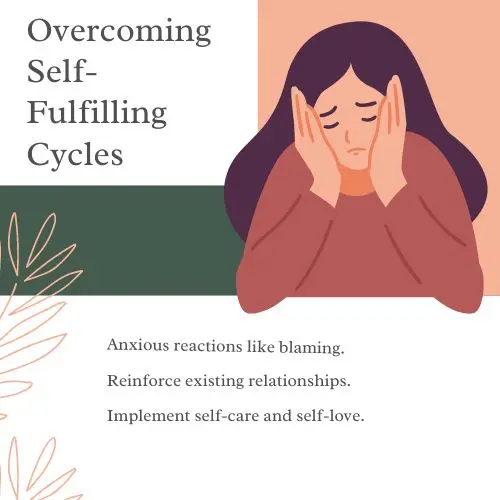
Insecurity naturally breeds behaviours confirming fears if left unchecked:
- Anxious reactions like blaming/withdrawal strain bonds, fulfilling “they’ll leave me” prophecies.
- Smothering neediness from constant reassurance drives partners away, fulfilling abandonment concerns.
- Projecting distrust breeds distrust, fulfilling worries over the relationship.
Self-reflection helps recognize automatic assumptions and reactions before acting on them compulsively. With practice, you can thoughtfully choose secure behaviours that simultaneously respect your needs and partners. This approach to resolving issues preserves intimacy over validating worst fears.
Relationship Maintenance Tips
Thriving relationships require conscious effort:
- Express Gratitude – Daily acknowledgement strengthens bonds more than assuming acceptance.
- Engage In Shared Interests – Enjoy quality bonding activities outside of responsibilities.
- Create Shared Experiences – Inside jokes and meaningful traditions foster intimacy.
- Manage Conflicts Respectfully – Address issues calmly without attacking character.
- Balance Closeness With Space – Healthy independence complements quality partnership.
- Support Each Other’s Growth – Uplift development individually and as a team.
- Communicate Thoughtfully – Express needs using compassion more than accusation.
By cultivating present fulfilment through understanding and partnership, past wounds heal, and fears become transparent unrealities, strengthening conviction in shared care.
Moving Forward With Hope
With empathy and active effort, relationship insecurity need not dictate fulfilment in the long term. By gaining self-awareness, addressing core beliefs compassionately, learning secure bonding skills, and nourishing present closeness through quality maintenance, even chronic anxieties can shift to a foundation empowering intimacy, trust and care within treasured connections. Have faith in your capacity for healing and growth.

